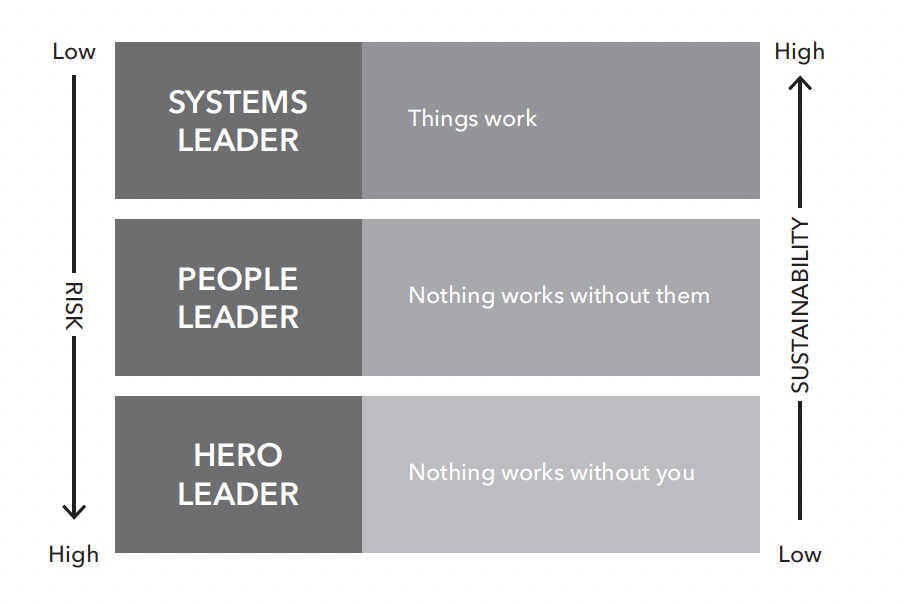
“Leadership is a series of behaviors rather than a role for heroes.” -Margaret Wheatley
I recently came across a leader model that caught my eye as I have been working with many leaders lately on systems thinking:

This image was in an article written by Alicia McKay titled You Don’t Need an MBA.
I have written about hero leadership before but what is powerful about McKay’s model is her distinction between people leaders and hero leaders. McKay talks about three kinds of leaders:
Hero leaders are characterized by sheer grit. If you want something done right you do it yourself. They are overworked, take big risks that are sold to others a safe options and they get hooked on the renegade buzz. There is a high level of burnout for hero leaders but they make their mark for better or for worse.
People Leaders are better at delegation than hero leaders and are sometimes converted hero leaders who realized they could not do it alone. It is progress because when heros redirect their energy into leading others, they reduce the single point of risk and disperse it across the team. This diversifies the effort.
Systems Leaders are entirely different because they make success sustainable. It is a bit untapped across the board in leaders of today but when you meet a systems leader, you know you are in the presence of greatness. This presence comes not from the hero leader character but from systems leaders ability to change their view by thinking systemically.
“Suddenly, how much we know, how hard we work, and how good our people are less important. Systems help us create new ways of thinking and working the default. Systems leaders set up their environment to maximize success, even when people are fallible.” Alicia McKay
Systems Leadership is about how you lead across boundaries – departmental, organizational, and sector-wide. It’s how you lead when you’re not in charge, and you need to influence others rather than pull a management lever.
Quick Look Self-Assessment
Hero Leadership:
Do I frequently take on tasks myself because I believe, sometimes subconsciously, I can do them better than my team? Yes / No
When making high-stakes decisions, do I often take big risks and present them as safer options to others? Yes / No
Do I feel a sense of accomplishment and excitement when I personally complete challenging tasks, even if it means extra work for me? Yes / No
People Leadership:
Have I transitioned from doing most things myself to effectively delegating tasks to my team? Yes / No
Do I ensure that my team feels empowered and supported, and do I distribute responsibilities well? Yes / No
Do I actively seek feedback from my team to improve our collective performance and make adjustments based on their input? Yes / No
Systems Leadership:
Have I established systems and processes that ensure my team or organization can succeed even in my absence? Yes / No
Am I effective at leading across boundaries (departmental, organizational, sector-wide) and influencing others without direct authority? Yes / No
Do I focus on creating and refining systems that enhance collaboration, efficiency, and long-term success? Yes / No
Self-Assessment
- Mostly Yes for Hero Leadership: Reflect on how this affects your workload, stress levels, and team dynamics.
- Mostly Yes for People Leadership: Consider how well you delegate, empower, and support your team.
- Mostly Yes for Systems Leadership: Think about how your systems and processes contribute to sustainable success and your ability to influence across boundaries.
Organizations are complex communities with distinct cultures. When I see whole groups within an organization feeling disenfranchised, it is often because they are waiting for hero leadership. It is costly in terms of productivity and engagement, not just for that group, but for all the groups, internally and externally, the group impacts.
The bottom line is that waiting for the hero is never a worthy enterprise. The good news is that a cultural shift is possible if leadership is distributed versus glorified. If individuals who make up the whole are able to work purposefully in valuable ways, the search for the hero is no longer a temptation.
System Leadership describes the way you need to work when you face large, complex, difficult, and seemingly intractable problems; where you need to juggle multiple uncertainties; where no one person or organization can find or organize the solution on their own; where everyone is grappling with how to make resources meet demand which is outstripping them; and where the way forward, therefore, lies in involving as many people’s energies, ideas, talents and expertise as possible…
But the leaders who get to Systems Leadership before they are being outpaced, who come to it because it is a value-based decision to lead this way, those are the legacy leaders with ideas and companies that are responsible for large-scale, positive shifts at work and beyond. If leading is a series of behaviors, rather than a heroic role, how will today look different than yesterday?
Leave a Reply